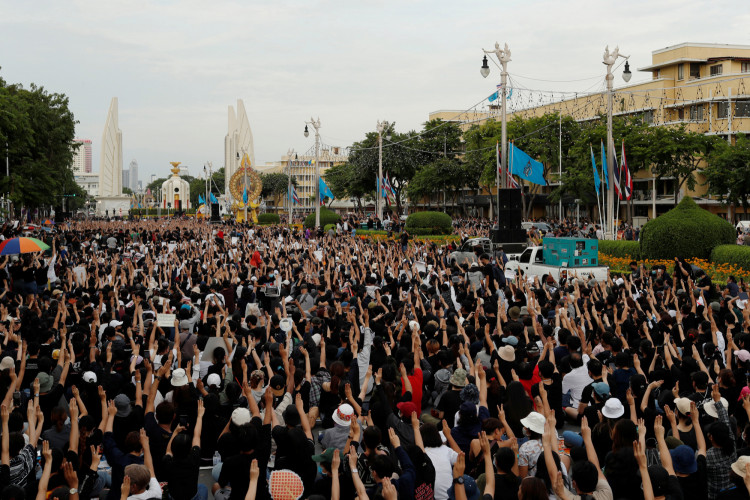Following two inconclusive votes and delayed elections, the Speaker of Thailand's lower house, Wan Muhammed Noor Mata, announced on August 16 that the next round of Prime Minister candidate voting will take place on the 22nd.
After the Move Forward Party withdrew from the governing coalition following its lower house election win, the Pheu Thai Party formed a new nine-party alliance, nominating a 61-year-old real estate tycoon and old friend of former Prime Minister Thaksin, Sretta, as the prime ministerial candidate.
However, the newly formed coalition doesn't have enough seats in the Parliament to secure Sretta's election as Prime Minister. The Pheu Thai Party's former ally, the Move Forward Party, has made it clear that it will not support Sretta in the Prime Minister vote.
With the current impasse, the Pheu Thai Party's only chance of winning the vote next week is to seek support from pro-military parties.
Past Delays and Controversies
Originally, the Thai Parliament intended to hold the latest Prime Minister election on August 4. However, due to the Constitutional Court reviewing complaints involving the leader of the Move Forward Party, Pita, the vote was postponed.
Last month, the Parliament voted twice on Pita. The first vote rejected his role as the new government's Prime Minister, while the second directly revoked his qualifications as a PM candidate.
The Move Forward Party, led by Pita, ranked first in the May lower house election. The party then formed an eight-party coalition with the second-ranked Pheu Thai Party and others, nominating Pita as their prime ministerial candidate.
After Pita's disqualification, Thailand's watchdog agency appealed to the Constitutional Court, highlighting complaints from citizens and members of Parliament against the Parliament's actions, accusing it of violating citizens' constitutional rights.
The Constitutional Court decided to examine the complaint closely, planning to rule on the appeal by August 16. According to the Bangkok Post, the Court's decision revealed that the complainants weren't Prime Minister candidates, and the Parliament's decision didn't directly impact their constitutional rights. Thus, the complaints were rejected.
This decision essentially means that Pita is out of the race for Prime Minister. The Move Forward Party plans to continue its appeal to the Parliament on the day of the PM vote. Supporters of the Move Forward Party had held several protest marches on the streets of Bangkok.
Current Political Landscape
After Pita's disqualification, the eight-party coalition led by the Move Forward Party fell apart. The Pheu Thai Party, which ranked second in the lower house election, then took charge, forming a new nine-party alliance.
This new alliance, with some old members of the previous eight-party group, holds only 238 seats out of 500 in the lower house, which is below the 312 seats the eight-party alliance once held.
In the PM vote, a combination of 500 members from the lower house and 250 members from the upper house will cast their votes. A candidate needs a majority of 376 votes to be elected as PM. Most members of the upper house are appointed by the military, meaning the Prime Minister candidate needs military approval.
Historically, the Pheu Thai Party and the military are not natural allies. Pheu Thai's predecessor, the Thai Rak Thai Party founded by Thaksin, was overthrown by the military in 2006. Again in 2014, a government led by Thaksin's sister, Yingluck, was toppled by the military.
The Pheu Thai Party's Deputy Leader, Phumtham Wechayachai, tried to court the Move Forward Party's support, saying he was prepared to apologize if it meant moving Thailand forward. The Move Forward Party holds 151 seats in the lower house, 10 more than the Pheu Thai Party.
However, the Move Forward Party's Secretary-General, Chaithawat Tulathon, announced in a press conference that they would not support the Pheu Thai Party's prime ministerial candidate. He stated that the current coalition did not reflect the voters' will and distorted their demands.
The Move Forward Party, which has the support of urban young voters, advocates for amendments to the constitution, limiting the power of the military, and removing lese majeste offenses. Established parties, including Pheu Thai, oppose any challenge to the Thai monarchy's status.
With the Move Forward Party's stance, the Pheu Thai Party's candidate will need the support of pro-military parties, including the People's National Power Party led by Deputy Prime Minister Bayi, and the Thai Unity National Party previously affiliated with current Prime Minister Bayu.
Bayi's party has signaled its willingness to support the Pheu Thai Party's candidate. Bayi, a former defense minister, wields significant influence in both the lower and upper houses.
Economic Impacts
A survey released last week by the Thailand Chamber of Commerce University showed that due to the uncertainty of the political landscape, Thailand's consumer confidence index in July saw its first drop in 14 months, slipping from 56.7 in June to 55.6.
The report highlighted concerns over when a stable new government would form, leading to reduced consumer spending. If consumer confidence isn't boosted, Thailand's economy might not meet the expected growth rate of 3.5% this year.





